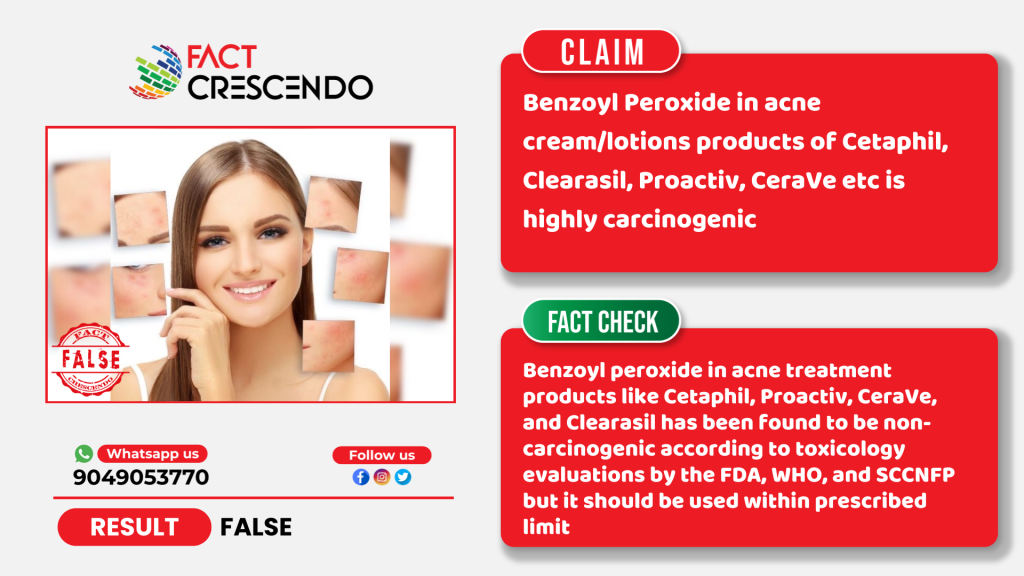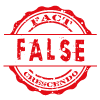
Social media users are currently raising their concerns on the chemicals used in various acne cleansing products. The concern is about the effect of Benzene on humans which forms because of chemical reactions in the products containing Benzoyl Peroxide.
However, fact Crescendo found the claim to be false. Benzoyl Peroxide is not carcinogenic and has been approved as an ingredient.
What’s the claim?
A social media user wrote, “Proactiv, Cetaphil, CeraVe, Clinique, Clearasil, and dozens more acne product brands were quietly in the news recently for the presence of “Benzene”, a carcinogen linked to leukaemia, nervous system and reproductive organ damage at 900% of the “accepted levels. The benzene is not added as an ingredient, it forms as a chemical reaction inside any products containing the ingredient benzoyl peroxide.”
Fact Check-
In our research, we first found out which of the brands mentioned in the post uses Benzoyl Peroxide as an ingredient in their products.
Proactiv: As per the information available on the Proactiv website, Benzoyl Peroxide is not listed as an ingredient in its products like ‘Mineral Acne Cleanser’ and ‘Acne Clearing Hydrator.’ But its product like Renewing Cleanser uses Benzoyl Peroxide with 2.5% concentration as an active ingredient.
Cetaphil: Cetaphil Acne Cream Cleanser does not use Benzoyl Peroxide as an ingredient. The active ingredient in this product is Salicylic Acid with a concentration of 2%. Other ingredients are Water, Cocamidopropyl Betaine, Distearyl Phthalic Acid Amide, Sodium Methyl Cocoyl Taurate, Sodium Chloride, etc.
CeraVe: CeraVe Acne Foaming Cream Cleanser uses Benzoyl Peroxide with concentration value of 4%. Benzoyl Peroxide in this product is used to clear acne breakouts and helps in preventing new acne from forming.
Clearasil: Clearasil uses Benzoyl Peroxide with 10% value as an active ingredient
From the above information, it is clear that there are few brands who uses Benzoyl Peroxide as an active ingredient in their Acne treatment creams. However, Benzoyl Peroxide is used as an ingredient and not formed from Benzene after its reaction with the product as mentioned in the post.
What is Benzoyl Peroxide and what is its use for skin care?
According to a website, Benzoyl Peroxide is a common ingredient found in over-the-counter (OTC) medications and products for mild to moderate acne. Products with stronger concentration of this chemical is also available in prescription form.
Is Benzoyl Peroxide Carcinogenic?
The FDA’s March 4, 2010, final rule classifies benzoyl peroxide (2.5–10%) as a permitted active ingredient in OTC topical acne treatments. This rule came effective after the study of its safety including genotoxicity, tumor promotion, carcinogenicity, and epidemiological data. But FDA also asked the brands to clearly mention the concentration and name of Benzoyl Peroxide in the products.
Additional warnings by FDA are to avoid Benzoyl Peroxide products if the consumer have sensitive skin or sensitive to the chemical. Additional warnings are to avoid unnecessary sun exposure, contacts with eyes, lips and mouths, etc.
In another report, FDA included Benzoyl Peroxide as a ‘Generally Recognized as Safe and Effective’ (GRASE) active ingredient in over-the-counter (OTC) topical acne drug products.
We also found that Benzoyl Peroxide has been listed as essential medicine by WHO on their 23rd list released in 2023.
Benzoyl Peroxide is also used as a food additive and its safety was studied by Joint FAO/WHO Expert Committee on Food Additives. The expert committee found that when benzoyl peroxide is used in food processing, it mostly turns into benzoic acid during heating or storage. Leftover benzoyl peroxide is broken down in the body and removed through urine. Although it creates small amounts of reactive particles during metabolism, but only few causes harm. Benzoyl peroxide can irritate the skin and cause allergic reactions, but studies show it does not directly damage DNA or cause cancer. In some specific lab tests, it helped promote tumors, but long-term studies in animals and research on workers and acne patients exposed to it found no link to increased cancer risk.
According to THE SCIENTIFIC COMMITTEE ON COSMETIC PRODUCTS AND NONFOOD PRODUCTS (SCCNFP), the FDA review found that while some studies suggested benzoyl peroxide (BPO) might promote tumor growth in sensitive mice, these results were inconsistent and not confirmed by other laboratories. Long-term studies in rats and mice showed no evidence of skin cancer after the use of BPO. Although, high doses of it caused skin ulcers when used in doses exceeding safe levels. Even under UV radiation exposure, BPO did not increase cancer risk in hairless mice. Overall, current evidence supports the safety of BPO in acne treatments, with no need for additional warnings. The IARC classifies BPO as a Group 3 carcinogen, meaning it has insufficient evidence of causing cancer in humans and limited evidence in animals.
Conclusion:
Fact Crescendo found the claim to be false. Benzoyl Peroxide in acne treatment products of Cetaphil, Proactiv, CeraVe, Clearasil etc does not cause cancer. The toxicology report of Benzoyl Peroxide by FDA, WHO and SCCNFP revealed that it is non carcinogenic but it should be used within prescribed limit.

Title:Benzoyl Peroxide used in Cetaphil, Proactiv and CeraVe acne cleaning products is not carcinogenic.
Written By: Siddharth SahuResult: False


